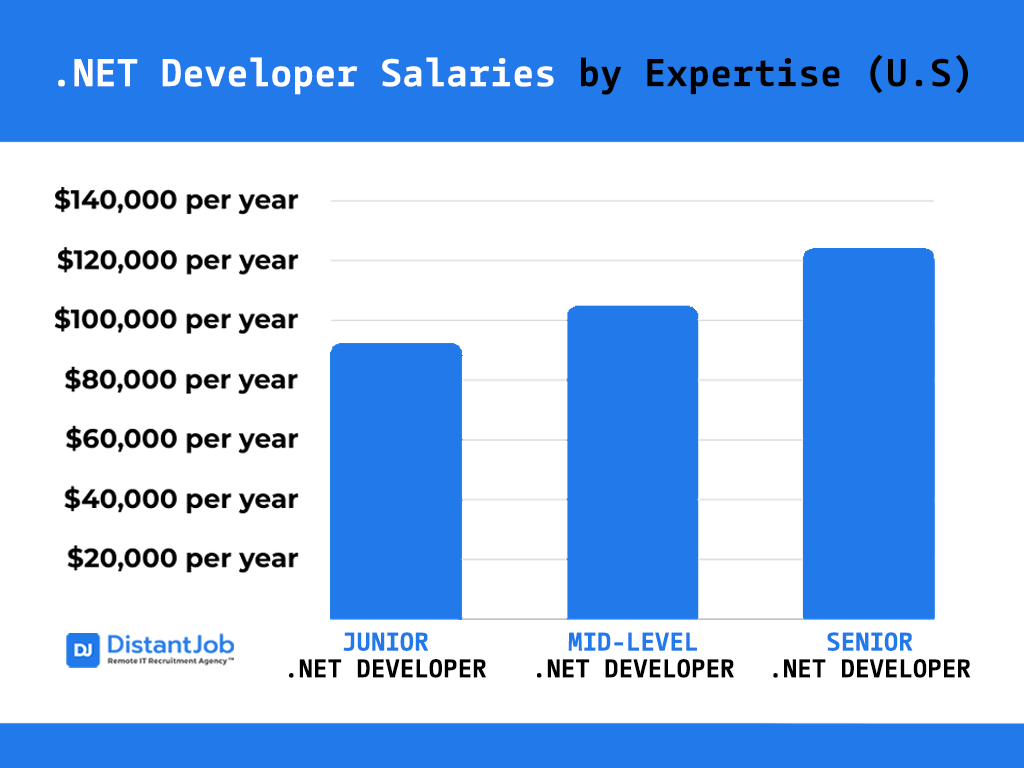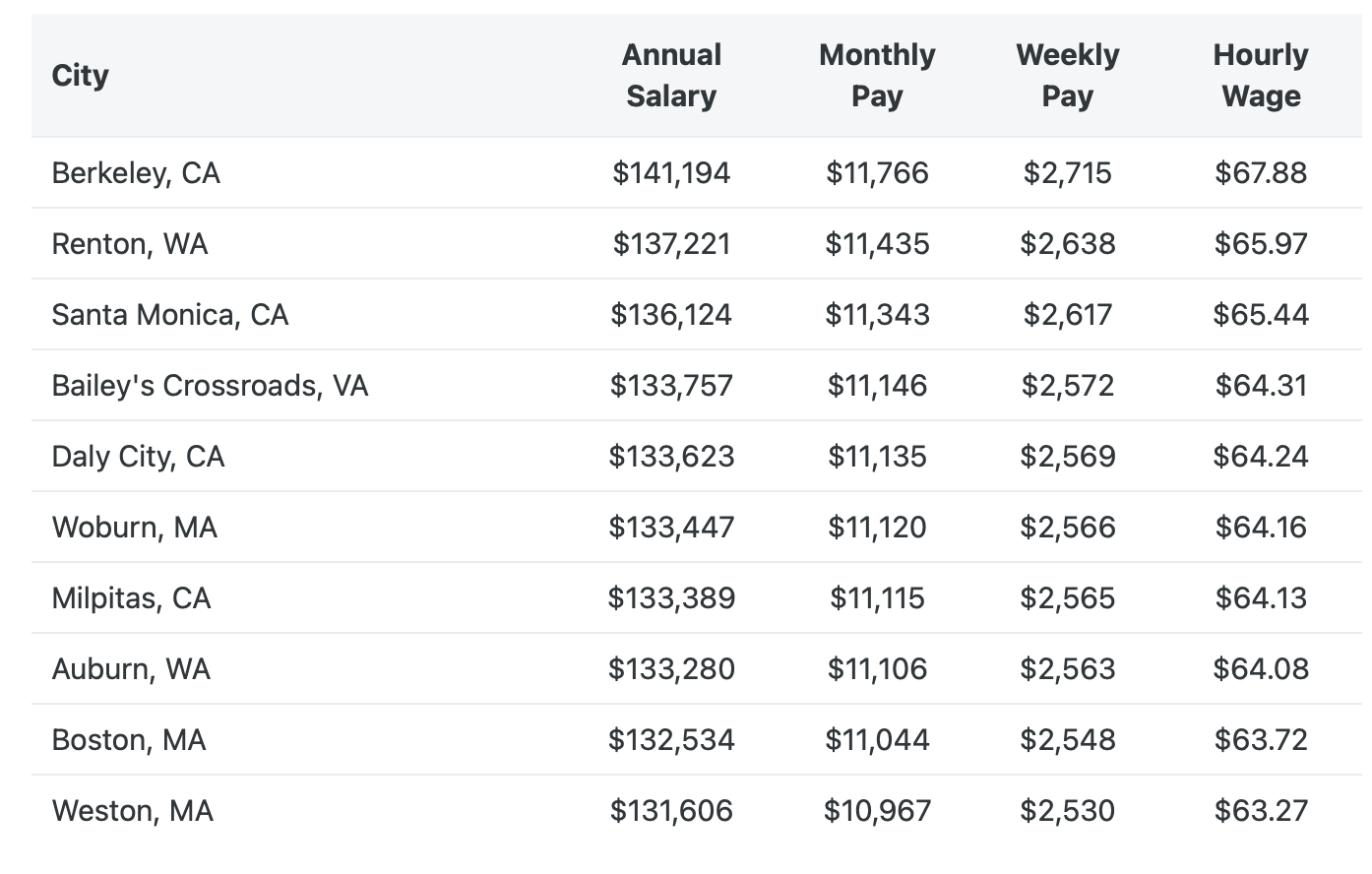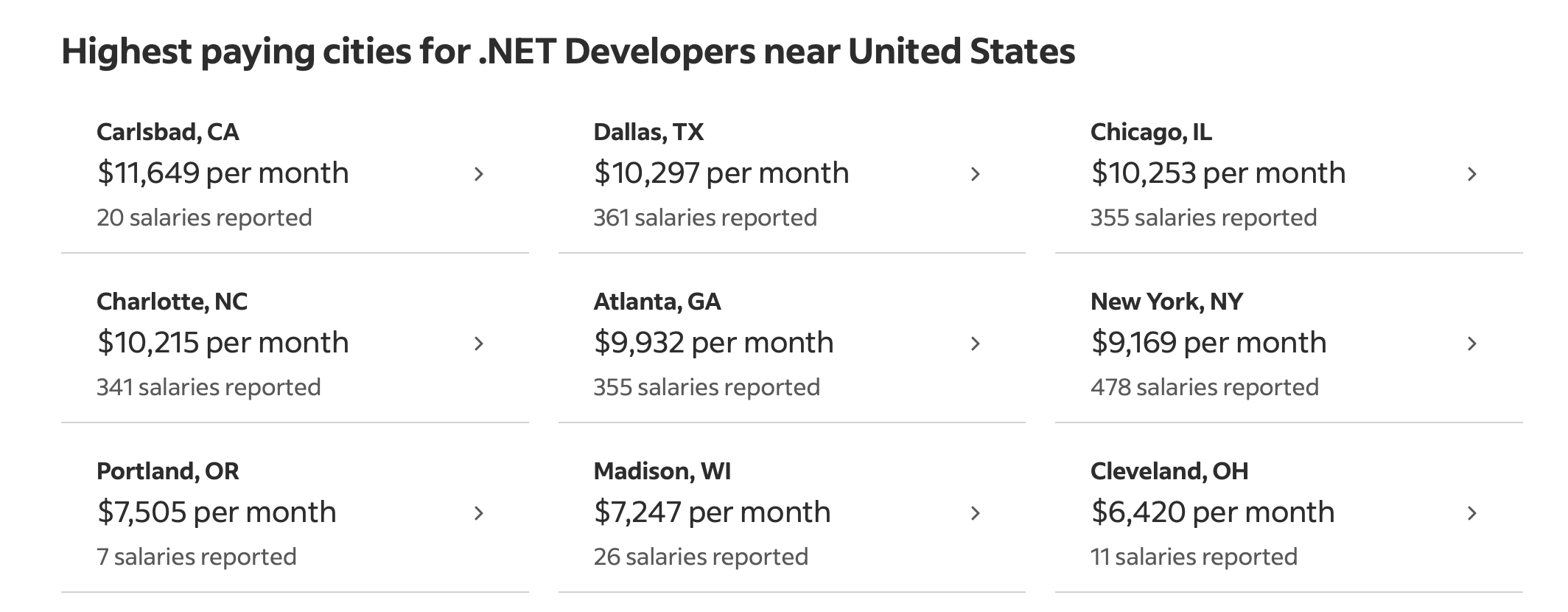According to Indeed , the current average salary of a .NET developer in the U.S. is currently $125,623 per year, equivalent to $69.97 per hour. Salaries range from $79,380 for those on the lower percentile to as high as $198,806 for top earners.
However, these figures are significantly influenced by several factors. The level of experience, industry trends, and geographical location directly impact the cost of hiring .NET programmers.
Whether you’re aiming to benchmark your earnings, negotiate a new position, understand the cost of hiring a .NET developer, or simply stay informed about industry standards, this guide serves as your comprehensive resource for detailed insights into .NET salaries.
Average Earnings of a .NET Developer (U.S.)
Let’s explore the average earnings of .NET developers per month, hour, and year in the United States, taking into account the values stated by Indeed, Glassdoor, Talent.com, and ZipRecruiter:
| Average Salary | Per Year | Per Month | Per Hour |
| Indeed | $125,623 | $8,894 | $69.97 |
| Glassdoor | $120,000 | $10,000 | $57.69 |
| ZipRecruiter | $111,761 | $9,313 | $54 |
| Talent.com | $109,865 | $9,155 | $52.82 |
The average salary of a .NET developer in the U.S. is $116,812 (taking into account the sources above), which translates to $9,734 per month and approximately $56.54 per hour.
This number may increase or decrease depending on the level of experience. Additionally, the salary of a .NET developer in the U.S. can greatly vary depending on the state.
NET Developer Salaries by Expertise (U.S)
In terms of experience, junior .NET developers often have a strong understanding of the framework, focusing on basic coding tasks and project support, while senior .NET developers encompass more complex tasks that involve advanced architecture design, optimization strategies and often leadership roles. The difference between the tasks and level of knowledge directly impacts their earnings.

On average a Junior .NET developer in the U.S. earns $92,014 per year, a Mid-level .NET developer earns $104,599 per year and a Senior .Net developer earns $123,988.
Here’s a breakdown of .NET salaries depending the level of experience:
Junior .NET Developer Salary
| Average Salary | Per Year | Per Month | Per Hour |
| Talent.com | $80,000 | $6,666 | $38.46 |
| Glassdoor | $109,490 | $9,124 | $63.06 |
| Zippia | $87,553 | $7,296 | $50.54 |
Mid-level .NET Developer Salary
| Average Salary | Per Year | Per Month | Per Hour |
| Glassdoor | $129.771 | $10,814 | $70.77 |
| ZipRecruiter | $89.944 | $7,495 | $61.92 |
| Salary.com | $94,082 | $7,840 | $64.92 |
Senior .NET Developer Salary
| Average Salary | Per Year | Per Month | Per Hour |
| Indeed | $114,010 | $9,500 | $78.47 |
| Glassdoor | $134,481 | $11,206 | $92.62 |
| Talent.com | $123,474 | $10,289 | $84.99 |
.NET Developer Salary: Most Expensive U.S. Locations
Location has a great impact on how much a .NET developer earns. In the U.S given that some cities have a significantly higher cost of living, the salaries also vary.
These are the highest paying U.S. cities for .NET professionals according to ZipRecruiter:

The most expensive city to hire .NET developers is Berkley, California with an average salary of $141.191.
According to Indeed’s data, Carlsbad, California emerges as the highest paying city for .NET developers, boasting an average monthly salary of $11,649, equating to an annual income of $139,788.

What Is The Average Salary Of A .Net Developer Globally?
The salary of .NET developers varies depending on the region they are living in. The difference is significant; however, we always like to highlight to our clients that price is not the same as quality. Before hiring a remote developer because they charge a low salary, make sure they fulfill your requirements, have the necessary skills, speak fluent English, work remotely, etc.
Let’s take a look at the numbers of the average salary of .NET experts on different countries, according to Indeed, Glassdoor, and Salary Expert:
| Country | Average Salary |
| Canada | $81,630 |
| Czech Republic | $65,000 |
| India | $44,800 |
| Poland | $48,500 |
| Romania | $65,000 |
| Philippines | $50,000 |
| US | $116,812 |
| Ukraine | $50,800 |
The U.S. and Canada are the most expensive countries to hire .NET developers, while countries located in Asia and Eastern Europe have the lowest salaries.
Additional Criteria To Determine a .NET Developer Salary
The two main criteria that help to define a .NET developer’s salary are level of experience and location. However, these are not the only factors that define the salary of a dot net programmer. Another key aspect is whether you’re hiring freelance .NET developers vs. full-time remote .NET developers.
With freelancers, you often pay an hourly rate or a project rate instead of a fixed salary. This means that you hire them for specific skills and tasks. For example, these are, on average, the rates of .NET developers on the freelance platform Upwork:

If you want to hire them for a single project or overall without having the idea of a long-term relationship, it makes sense. But if you want them to become part of your company, you likely need to reconsider if this is the best option for you, as they probably have other projects on their plate and are working with other companies.
Which .NET Skills Affect A .NET Developer’s Salary?
Besides defining what type of developer you need (full-time remote vs. freelance), the skills are other criteria that define a .NET developer’s salary. There are certain skills within this framework that are more valuable than others. For example:
- ASP.NET MVC – Open-source software that provides access to client-side technologies, allowing .NET developers to produce software efficiently.
- jQuery – Feature-rich JS library used to build interactive web pages.
- Client-side technology – Allows .NET developers to build interfaces that are easy for users to use and visually pleasing.
- Xamarin – Platform of .NET developer tools and libraries that are especially helpful for mobile app development. Also commonly referred to as Hybrid Mobile App Development Framework.
- ASP.NET – Is a framework that makes it easier for ASP.NET developers to reuse their code in multiple places. It gives them the ability to set apart their app’s code from its presentation layer.
So, how do these skills impact a .NET salary?
| Skill | Average Annual Salary (USD) |
| ASP.NET MVC | $97,000 – $118,000 |
| jQuery | $100,000 – $120,000 |
| Xamarin | $118,276 – $133,000 |
| Oracle | $107,000 – $150,000 |
.NET developers with knowledge in Oracle and Xamarin have the highest earning potential.
Which Skills To Value When Offering The Salary Or Considering A Raise?
The answer to this question will depend on the type of .NET developer skills your company values and needs. Every project will have its own specificities, and there should be someone on the development team that can tell you what to look for. If that’s not the case, it’s probably time to find an expert to fill this position.
Here’s a list of the considerations you should have in order of priority:
- Rarely needed skills in the job market, as they are harder to fill (and come at a cost).
- All other needed skills Determine the skills that are not necessary but Nice To Have (NTH).
- Finding candidates who encompass both needed skills and NTH is the best option, as these people will bring more value to your team.
Conclusion
There you have it, the entire criteria you need for establishing the salary your new candidate should have. And if you need help with finding a dot net developer, look no further. We\re here to assist it with any hiring needs.





